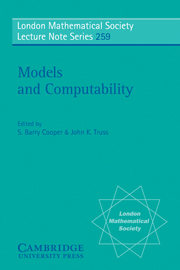Book contents
- Frontmatter
- Contents
- Preface
- Continuous Functionals of Dependent and Transfinite Types
- Degree-Theoretic Aspects of Computably Enumerable Reals
- Simplicity and Independence for Pseudo-Algebraically Closed Fields
- Clockwork or Turing U/universe? - Remarks on Causal Determinism and Computability
- A Techniques Oriented Survey of Bounded Queries
- Relative Categoricity in Abelian Groups
- Computability and Complexity Revisited
- Effective Model Theory: The Number of Models and Their Complexity
- A Survey on Canonical Bases in Simple Theories
- True Approximations and Models of Arithmetic
- On the Topological Stability Conjecture
- A Mahlo-Universe of Effective Domains with Totality
- Logic and Decision Making
- The Sheaf of Locally Definable Scalars over a Ring
- Human Styles of Quantificational Reasoning
- Recursion Theoretic Memories 1954–1978
- Fields Definable in Simple Groups
- A Combinatory Algebra for Sequential Functionals of Finite Type
- Model Theory of Analytic and Smooth Functions
Effective Model Theory: The Number of Models and Their Complexity
Published online by Cambridge University Press: 17 May 2010
- Frontmatter
- Contents
- Preface
- Continuous Functionals of Dependent and Transfinite Types
- Degree-Theoretic Aspects of Computably Enumerable Reals
- Simplicity and Independence for Pseudo-Algebraically Closed Fields
- Clockwork or Turing U/universe? - Remarks on Causal Determinism and Computability
- A Techniques Oriented Survey of Bounded Queries
- Relative Categoricity in Abelian Groups
- Computability and Complexity Revisited
- Effective Model Theory: The Number of Models and Their Complexity
- A Survey on Canonical Bases in Simple Theories
- True Approximations and Models of Arithmetic
- On the Topological Stability Conjecture
- A Mahlo-Universe of Effective Domains with Totality
- Logic and Decision Making
- The Sheaf of Locally Definable Scalars over a Ring
- Human Styles of Quantificational Reasoning
- Recursion Theoretic Memories 1954–1978
- Fields Definable in Simple Groups
- A Combinatory Algebra for Sequential Functionals of Finite Type
- Model Theory of Analytic and Smooth Functions
Summary
Abstract
Effective model theory studies model theoretic notions with an eye towards issues of computability and effectiveness. We consider two possible starting points. If the basic objects are taken to be theories, then the appropriate effective version investigates decidable theories (the set of theorems is computable) and decidable structures (ones with decidable theories). If the objects of initial interest are typical mathematical structures, then the starting point is computable structures. We present an introduction to both of these aspects of effective model theory organized roughly around the themes of the number and types of models of theories with particular attention to categoricity (as either a hypothesis or a conclusion) and the analysis of various computability issues in families of models.
Basic Notions
The lectures on which this paper is based were intended to be a brief introduction to effective model theory centered around one set of issues: the number of models of specified type and, in particular, the notion of categoricity. For more general introductions we refer the reader to The Handbook of Recursive Algebra (Ershov et al. [1998]), especially the articles by Harizanov [1998] and Ershov and Goncharov [1998]. This Handbook also contains other useful survey papers on aspects of effective model theory and algebra and an extensive bibliography. The one most closely related to the theme of this paper is Goncharov [1998]. Another interesting survey is Millar [1999] in The Handbook of Computability Theory (Griffor [1999]).
- Type
- Chapter
- Information
- Models and Computability , pp. 193 - 240Publisher: Cambridge University PressPrint publication year: 1999
- 13
- Cited by



